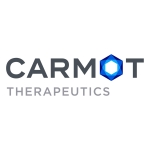BERKELEY, Calif.--(BUSINESS WIRE)--Carmot Therapeutics, Inc. (Berkeley, CA), a clinical-stage biotechnology company applying its proprietary therapeutic platform, Chemotype Evolution (CE), to discover and develop disease-modifying therapies in metabolic disease and cancer, announced today that in connection with the recent U.S. Food and Drug Administration (FDA) approval and commercial launch of Amgen’s LUMAKRAS (sotorasib), Carmot is eligible to receive royalty payments from future sales.

FDA recently approved LUMAKRAS for the treatment of adult patients with KRAS G12C-mutated locally advanced or metastatic non-small cell lung cancer (NSCLC), as determined by an FDA-approved test, who have received at least one prior systemic therapy. LUMAKRAS has received accelerated approval based on overall response rate (ORR) and duration of response (DoR). Continued approval for this indication may be contingent upon verification and description of clinical benefit in a confirmatory trial(s).
Amgen and Carmot Therapeutics entered into a research collaboration and license agreement announced in 2014 with objectives that included identification of KRASG12C targeted therapeutics. Within this collaboration, Carmot and Amgen successfully applied Chemotype Evolution to identify novel binding sites and covalent inhibitors of KRASG12C. Amgen then built on those findings to develop LUMAKRAS. Under the terms of the agreement Carmot is entitled to research funding, milestone payments and a royalty on commercial sales of products emerging from the collaboration.
“The rapid development of LUMAKRAS illustrates the value of Chemotype Evolution and its ability to complement structure-based drug design and medicinal chemistry,” commented Stig K. Hansen, PhD, Carmot’s co-founder and Chief Executive Officer. “Chemotype Evolution is a transformative technology that can accelerate the discovery of drugs for challenging targets. KRAS was deemed an undruggable target for decades, but Chemotype Evolution combined with published findings, enabled Carmot and Amgen to rapidly gain novel insights that aided Amgen in the discovery of AMG 510, now LUMAKRAS.
More broadly, we have greatly expanded the capabilities of Chemotype Evolution and used it to develop a portfolio of programs in metabolic disease and cancer. Just as Chemotype Evolution provided critical new insights into KRAS function, Carmot has used the technology to generate deep insights in other disease areas”.
About Carmot Therapeutics, Inc. Carmot Therapeutics (“Carmot”) is focused on the discovery and development of disease-modifying therapies for patients living with metabolic diseases and cancer. Carmot applies Chemotype Evolution (CE), a pioneering drug discovery technology, in combination with unique biological expertise to identify innovative and superior therapeutics. In metabolic disease, Carmot is combining CE with novel insights into incretin receptor signaling to develop a broad, valuable pipeline of peptide-based and small molecule therapeutics. Carmot’s dual GLP-1/GIP receptor modulator has entered Phase 2 development and has the potential to be best in a new class of treatments for type 2 diabetes and related indications. In addition, Carmot is using CE to identify novel covalent inhibitors and to develop new therapeutics targeting major oncogenic pathways, internally and with partners. Carmot has successfully applied CE with strategic partners including the collaboration with Amgen that supported Amgen’s development of LUMAKRAS (sotorasib), the first KRAS inhibitor to be approved.
About Non-Small Cell Lung Cancer and the KRAS G12C Mutation Lung cancer is the leading cause of cancer-related deaths worldwide, and it accounts for more deaths worldwide than colon cancer, breast cancer and prostate cancer combined. Overall survival rates for NSCLC are improving, but remain poor for patients with advanced disease and 5-year survival is only 7% for those with metastatic disease.
KRAS G12C is the most common KRAS mutation in NSCLC. In the U.S., about 13% of patients with non-squamous NSCLC harbor the KRAS G12C mutation. Unmet medical need remains high and treatment options are limited for NSCLC patients with the KRAS G12C mutation whose first-line treatment has failed to work or has stopped working. The outcomes with current therapies are suboptimal with a median progression-free survival of approximately 4 months following second-line treatment of KRAS G12C-mutated NSCLC.
Contacts
James Watson
Chief Business Officer
bd@carmot.us
www.carmot-therapeutics.com